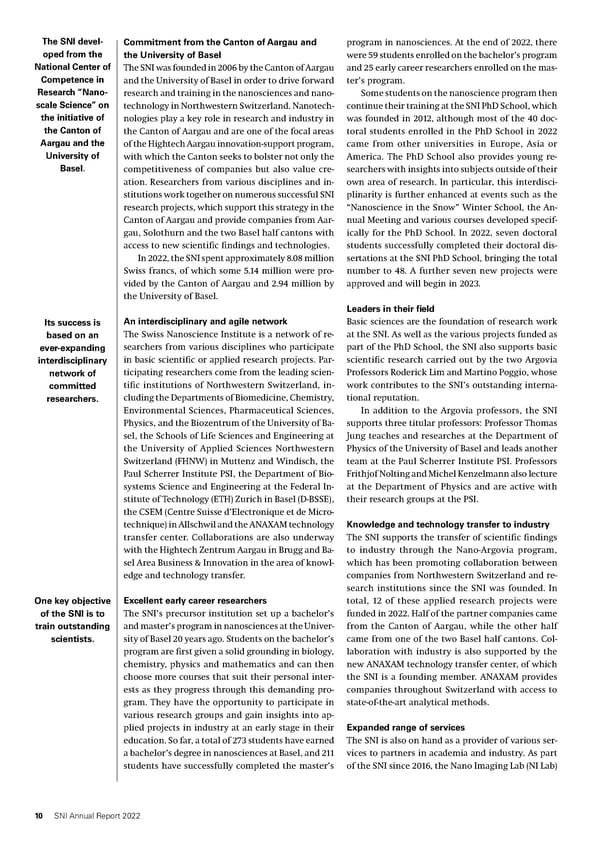The SNI devel- Commitment from the Canton of Aargau and program in nanosciences. At the end of 2022, there oped from the the University of Basel were 59 students enrolled on the bachelor’s program National Center of The SNI was founded in 2006 by the Canton of Aargau and 25 early career researchers enrolled on the mas- Competence in and the University of Basel in order to drive forward ter’s program. Research “Nano- research and training in the nanosciences and nano- Some students on the nanoscience program then scale Science” on technology in Northwestern Switzerland. Nanotech- continue their training at the SNI PhD School, which the initiative of nologies play a key role in research and industry in was founded in 2012, although most of the 40 doc- the Canton of the Canton of Aargau and are one of the focal areas toral students enrolled in the PhD School in 2022 Aargau and the of the Hightech Aargau innovation-support program, came from other universities in Europe, Asia or University of with which the Canton seeks to bolster not only the America. The PhD School also provides young re- Basel. competitiveness of companies but also value cre- searchers with insights into subjects outside of their ation. Researchers from various disciplines and in- own area of research. In particular, this interdisci- stitutions work together on numerous successful SNI plinarity is further enhanced at events such as the research projects, which support this strategy in the “Nanoscience in the Snow” Winter School, the An- Canton of Aargau and provide companies from Aar- nual Meeting and various courses developed specif- gau, Solothurn and the two Basel half cantons with ically for the PhD School. In 2022, seven doctoral access to new scientific findings and technologies. students successfully completed their doctoral dis- In 2022, the SNI spent approximately 8.08 million sertations at the SNI PhD School, bringing the total Swiss francs, of which some 5.14 million were pro- number to 48. A further seven new projects were vided by the Canton of Aargau and 2.94 million by approved and will begin in 2023. the University of Basel. Leaders in their field Its success is An interdisciplinary and agile network Basic sciences are the foundation of research work based on an The Swiss Nanoscience Institute is a network of re- at the SNI. As well as the various projects funded as ever-expanding searchers from various disciplines who participate part of the PhD School, the SNI also supports basic interdisciplinary in basic scientific or applied research projects. Par- scientific research carried out by the two Argovia network of ticipating researchers come from the leading scien- Professors Roderick Lim and Martino Poggio, whose committed tific institutions of Northwestern Switzerland, in- work contributes to the SNI’s outstanding interna- researchers. cluding the Departments of Biomedicine, Chemistry, tional reputation. Environmental Sciences, Pharmaceutical Sciences, In addition to the Argovia professors, the SNI Physics, and the Biozentrum of the University of Ba- supports three titular professors: Professor Thomas sel, the Schools of Life Sciences and Engineering at Jung teaches and researches at the Department of the University of Applied Sciences Northwestern Physics of the University of Basel and leads another Switzerland (FHNW) in Muttenz and Windisch, the team at the Paul Scherrer Institute PSI. Professors Paul Scherrer Institute PSI, the Department of Bio- Frithjof Nolting and Michel Kenzelmann also lecture systems Science and Engineering at the Federal In- at the Department of Physics and are active with stitute of Technology (ETH) Zurich in Basel (D-BSSE), their research groups at the PSI. the CSEM (Centre Suisse d’Electronique et de Micro- technique) in Allschwil and the ANAXAM technology Knowledge and technology transfer to industry transfer center. Collaborations are also underway The SNI supports the transfer of scientific findings with the Hightech Zentrum Aargau in Brugg and Ba- to industry through the Nano-Argovia program, sel Area Business & Innovation in the area of knowl- which has been promoting collaboration between edge and technology transfer. companies from Northwestern Switzerland and re- search institutions since the SNI was founded. In One key objective Excellent early career researchers total, 12 of these applied research projects were of the SNI is to The SNI’s precursor institution set up a bachelor’s funded in 2022. Half of the partner companies came train outstanding and master’s program in nanosciences at the Univer- from the Canton of Aargau, while the other half scientists. sity of Basel 20 years ago. Students on the bachelor’s came from one of the two Basel half cantons. Col- program are first given a solid grounding in biology, laboration with industry is also supported by the chemistry, physics and mathematics and can then new ANAXAM technology transfer center, of which choose more courses that suit their personal inter- the SNI is a founding member. ANAXAM provides ests as they progress through this demanding pro- companies throughout Switzerland with access to gram. They have the opportunity to participate in state-of-the-art analytical methods. various research groups and gain insights into ap- plied projects in industry at an early stage in their Expanded range of services education. So far, a total of 273 students have earned The SNI is also on hand as a provider of various ser- a bachelor’s degree in nanosciences at Basel, and 211 vices to partners in academia and industry. As part students have successfully completed the master’s of the SNI since 2016, the Nano Imaging Lab (NI Lab) 10 SNI Annual Report 2022
 SNI Annual Report 2022 Page 9 Page 11
SNI Annual Report 2022 Page 9 Page 11